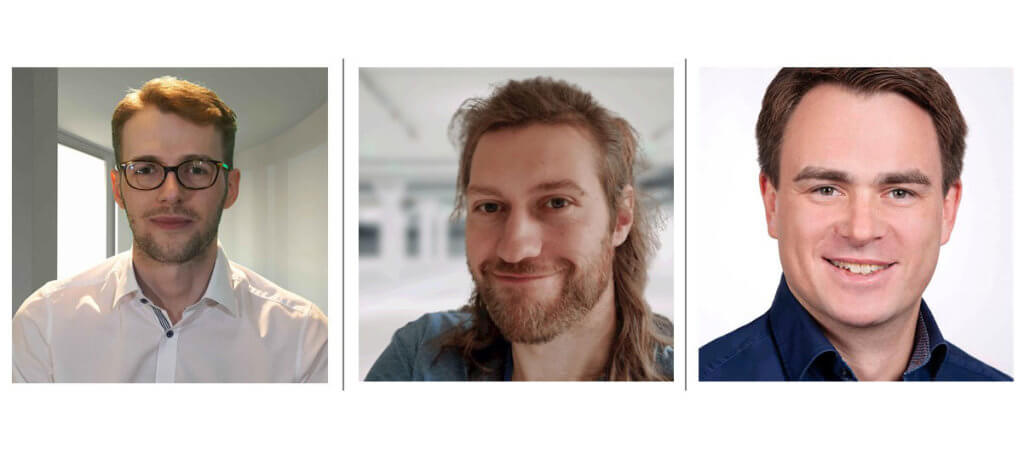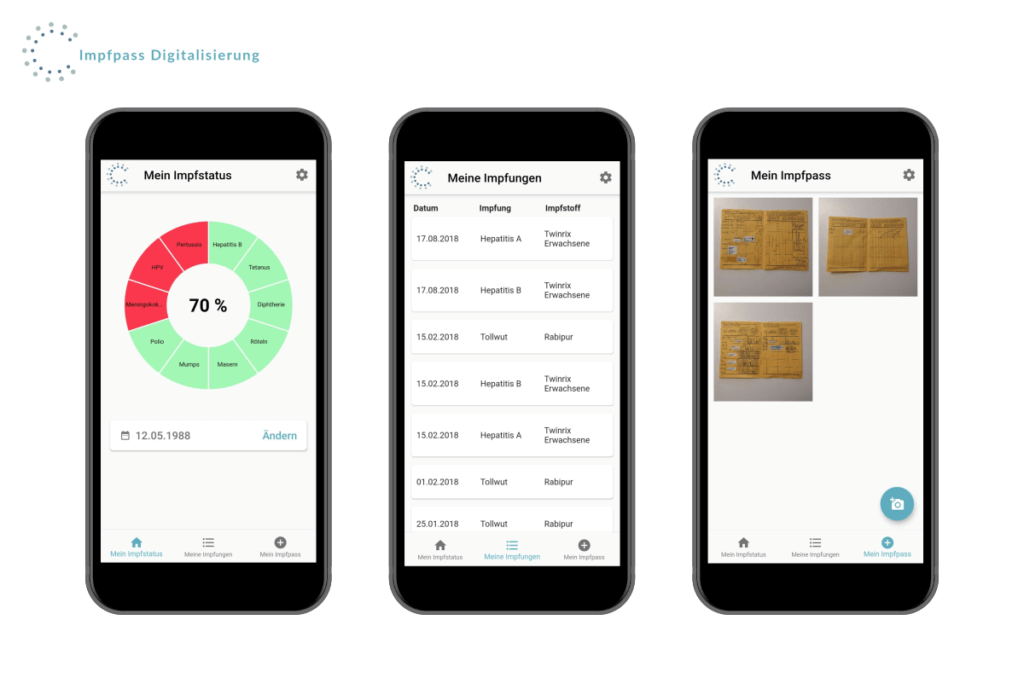Never look for the vaccination record again
Judith Hillen
In which box or drawer is the vaccination card hidden? Many people in search of the small yellow booklet may have asked themselves this question. Benedikt Marquardt, Thomas Steeger and Tobias Herion, who are part of the 5-HT network with their startups IO Propagator and DNAid Diagnostics have joined forces to digitize the vaccination record with their App Vacuna. The beta version of the mobile application, which allows users to save their vaccination data, view their vaccination status and receive customized vaccination recommendations, has been available for a few days. In this interview, Benedikt Marquardt, Thomas Steeger and Tobias Herion talk about the advantages of digitizing the vaccination record, how their app can be linked to the electronic patient file and what makes Vacuna different from other apps for vaccination record digitization.

Benedikt Marquardt, Thomas Steeger and Tobias Herion
Why do I need a digital vaccination card?
Tobias Herion: A big advantage is that you can no longer lose a digital vaccination card. When we ask friends and acquaintances where their vaccination card is, we often get the answer: "I don't know, it was probably lost during the last move. With our app, however, the data from the vaccination card is not simply saved, because even a simple photo would suffice. We want to ensure that users can draw real added value from their vaccination data.
Benedikt Marquardt: Once the vaccination data have been digitized, we can use them to make vaccination recommendations, for example for the standard vaccinations of the Robert Koch Institute. With the digital vaccination record, we also want to encourage people to look into their vaccination status at all. The incentive to go to the doctor and get vaccinated is often not particularly great. However, if you have a digital vaccination card and therefore know your vaccination status, you are more likely to think about having a recommended vaccination or refreshing it.
Since a few days your App Vacuna is available in a beta version for iOS and Android. What features does the application offer?
Benedikt Marquardt: At the beginning, the user takes photos of his vaccination card, which are stored in the app so that the information can no longer be lost. At the same time, the vaccination data is digitized and the user receives a list of his vaccinations with date and vaccine in the free basic version. In a proof of concept lasting several months, we have already validated the automated digitization via Computer Vision and Machine Learning, which is not yet used in the beta version. In a paid version, information on the doctor and batch number is added so that the user can be notified if there has been a vaccine recall. Reimbursement by health insurance companies is made possible by the qualification as a digital health application, which we are aiming for in the medium term after approval as a medical device. Finally, the vaccination status is determined from the overview of vaccinations, based on the vaccination recommendations of the Robert Koch Institute. In addition, we are planning to put you in contact with a doctor who will give personalized vaccination recommendations via telemedicine, if desired. In addition, the app should soon be able to send push notifications when a vaccination needs to be refreshed or is recommended for the user, for example due to age.

Vacuna App and Logo
How do you differ from other apps for vaccination card digitization?
Benedikt Marquardt: One point that is very important to us is the user experience. With the previous apps, the user has to enter each vaccination by hand. In our opinion, this high effort is one of the main reasons why the existing apps are not very widespread. By using Computer Vision, we make it much more convenient to use: You open the app, take pictures of your vaccination card and can directly view your vaccination status.
Tobias Herion: In addition, with Vacuna we offer a customized solution. Many apps provide rather general information, so that the user sometimes does not know which recommendation applies to him personally. We also provide an overview of the entire vaccination status and thus support the comprehensive digitalization of the vaccination card.
How is the protection of personal data ensured?
Benedikt Marquardt: Data protection requirements are particularly high for healthcare applications. That's why we had a lot of respect for it at the beginning and asked ourselves whether we could actually manage this as a startup. But if you take a closer look at data protection requirements such as the DSGVO or MDR, anything is possible. So - in addition to the obligatory data protection declaration - we have developed a data protection concept for the app, in which, among other things, we carry out a risk analysis and evaluation of the data processing. Our experience with IO Propagator is also helpful here, as we have already advised a large hospital as a service provider in health and patient data protection. In general, we collect as little data as possible and nothing happens without the explicit consent of the user. In addition, everything runs on servers hosted in Germany.
How did the idea for your app for vaccination card digitalization come about?
Benedikt Marquardt: Thomas and I have been working on the development of SaaS solutions in our Startup IO Propagator for a year now. Because we wanted to focus on the Digital Health sector, a startup mentor brought us together in March with Tobias, who has already founded a startup in the health sector. The three of us now cover both the technical and the business side.
Tobias Herion: The idea of digitizing the vaccination record and thus offering a service for health-conscious customers had been on my mind for two or three years. Since Benedikt and Thomas were looking for use cases for their computer vision technology, the digital vaccination card was a good business idea.
What will happen from now on with the development of Vacuna?
Benedikt Marquardt: The last two months we have been building our MVP day and night. With the beta phase we now want to get feedback from our users as soon as possible.
Tobias Herion: We want to find out who our users are and which functionalities they are interested in. The main target group is probably young adults in their twenties or thirties who are technophile, travel a lot for business or pleasure and may already have children, so they are interested in appropriate vaccination protection. However, a digital vaccination card with appropriate vaccination recommendations may also be relevant for people over 60 who are exposed to particular health risks.
How do you currently finance yourself?
Thomas Steeger: Currently we are supported by the Gründerstipendium NRW. Soon we will decide whether we will remain bootstrapped after that or rely on investors.
Tobias Herion: In the short term, we want to find out whether it would make sense for our users to have Vacuna qualified as a medical device. If that were the case, we would need additional capital for medical device approval.
From 2021, the electronic patient file (ePA) will be introduced throughout Germany. What role does Vacuna play in this?
Thomas Steeger: The vaccination record is the first medical information object (MIO) to be realized within the electronic patient file - in this respect our topic is very topical.
Tobias Herion: However, we do not want to compete with the ePA, but see ourselves as complementary to it. The ePA only offers the data standard and the database for the e-vaccination passport, but does not take care of the digitalization of old data. This will probably become the task of the doctors and, as a manual process, is very time-consuming and therefore expensive. Our app makes it possible for everyone at home to digitize their own vaccination card and to enjoy the benefits of the ePA immediately. Therefore, we now want to show which applications are possible with data sets like ours and arouse interest among users. If the health insurance companies later release corresponding interfaces and if the users give their consent, we will be able to connect to the systems and make our data available directly to the ePA.
How did you come into contact with 5-HT?
Tobias Herion: I have already founded another startup in the Rhine-Neckar region with DNAid Diagnostics and came into contact with 5-HT for the first time by participating in the Life Science Accelerator in Heidelberg. Due to the focus on Digital Health, we see 5-HT as the ideal partner for our goal of driving forward the digitization of vaccination certificates.
In what ways can 5-HT support you in your further development?
Tobias Herion: We hope that 5-HT will make us better known and attract the attention of potential customers. In a next step, it would be helpful to use 5-HT to get in contact with health insurance companies or industry partners to discuss possible applications for our solution. We are very pleased to be able to advance the topic of Digital Health in Germany together with regional startup networks like 5-HT.
Thomas Steeger: Germany still has a lot to catch up on in terms of digitization, particularly in the healthcare sector. With the digital vaccination card, we want to take a first step in this direction.
5-HT Chemistry & Health Newsletter
Want the latest tech and industry news, events, relevant info from the ecosystem and more?
Subscribe to 5-HT Newsletter now Subscribe to 5-HT Newsletter now
Become part of the 5-HT Chemistry & Health
Exchange ideas with innovative startups and future-oriented companies in our ecosystem. We look forward to meeting you!